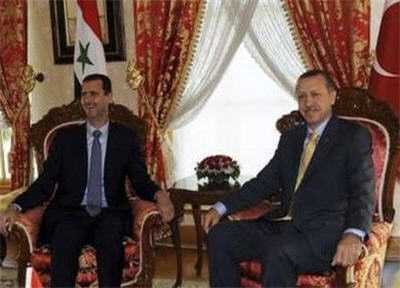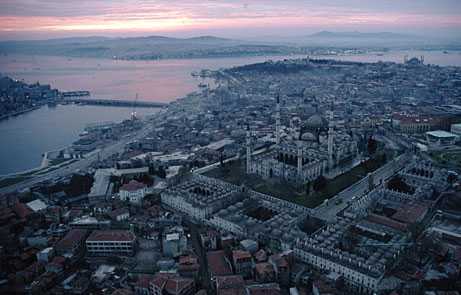THE JERUSALEM POST


 Turkey and Syria have signed a bilateral cooperation accord under which top ministers from the two countries will meet each year.
Turkey and Syria have signed a bilateral cooperation accord under which top ministers from the two countries will meet each year.
Turkish Foreign Minister Ahmet Davutoglu and his Syrian counterpart Walid Mualem who is currently visiting Turkey along with President Bashar al-Assad, signed the agreement on Wednesday.
They also said that the two countries would establish a high level strategic cooperation council.
“We hope to turn our relations into maximum cooperation based on a principle of “zero problem,” the Turkish minister stressed.
Touching on the meeting to be held among Turkey, Syria, Iraq and Arab League in Istanbul on Thursday to establish a dialogue between Syria and Iraq, Turkish official said that they all believed the meeting would be successful.
Syrian president Bashar al-Assad held talks with Turkish Prime Minister Tayyip Erdogan in Istanbul on Wednesday and the two countries signed a wide-ranging agreement to improve political, economic and social ties.
They agreed to abolish visas between the two countries.
Source: www.alalam.ir, 17 Sept. 2009

Thomas Strong, 19, from Carlisle in Cumbria, approached the quayside statue while on holiday in Marmaris on Sunday and dropped his shorts, before launching into a tirade of abuse.
Local boat men were so furious at the insult that they called the police to arrest Strong.
The offence of insulting Ataturk, the former Army Officer who led the Turkish national movement and established the Republic of Turkey in 1923, is punishable by imprisonment for Turks.
Ayhan Hatay, who watched Strong’s actions in horror, said: “We couldn’t believe what we were seeing. Lots of tourists come and look at the Ataturk statue and take pictures. But this lad was something else – he stripped his clothes off and started waving his manhood and swearing at Ataturk.
“The police were there in minutes and took him away in handcuffs. To be honest he’s lucky it was the police that took him – Ataturk is the father of the Turkish Republic and a national hero – the local boys wanted to kill him for being so insulting – what is it about the British that they seem to enjoy being so rude and disrespectful.”
The Turkish authorities believed that Strong must either be drunk or suffering from a mental illness, but he was given a clean bill of health after being taken to hospital.
The teenager was held in police cells for several hours before being brought before a special court on Sunday afternoon, but could offer no explanation for his behaviour.
Answering the charge of insulting Ataturk, Strong told the court: “I don’t know why I did it”.
The judge ordered him to be immediately deported from Turkey and banned from returning for five years.
After the court case Strong was taken by police to Dalaman airport and put on a plane back to Britain.
British tourist John Connolley, who is on holiday in Marmaris, praised the actions of the Turkish authorities.
“To be honest I admire the Turks for their direct action. The boy had no reason to strip naked in public and insult a much loved national leader. He obviously was looking for a reaction and he got one – perhaps not what he expected though.
“Tourists should appreciate that if you come to Turkey you should behave respectfully – I think it’s a good thing – otherwise you get Brits behaving horribly like they have been on the Greek islands recently. In fact I think we should adopt the same attitude back home and deport badly behaved foreigners.”
However, for some Turks, the punishment was not severe enough and a Facebook group titled ‘String up Strong’ has been set up, calling for him to be hanged.
After the collapse of the Ottoman Empire, founded in the 13th century, Ataturk led the national movement in the Turkish War of Independence.
He defeated forces sent by the Allied Powers and established the modern Republic of Turkey.
Ataturk, born in 1881, was President of Turkey for 15 years until his death in 1938.
Source: www.telegraph.co.uk, 17 Aug 2009

 Remains of ancient temple found in Turkey
Remains of ancient temple found in TurkeyExcavations have revealed the first evidence of a Jewish presence in the ancient port city of Andriake in Lycia, now located in southern Turkey, the Turkish daily Zaman reported Tuesday.
The find was unexpected and has created a buzz in the archaeology community.
“To encounter remnants of Jewish culture for the first time has caused great excitement,” said site chief Nevzat Çevik, an archaeology professor at Akdeniz University. “We’re adding another layer to what we know of Lycian culture. Now that we know that there was a Jewish presence in Lycia as well, we can follow this path and better understand other finds.”
Source: www.jta.org, August 13, 2009
Ankara (Turkey), August 13 (ANI): Archaeologists have uncovered a centuries-old Jewish temple in Antalya, Turkey, which may date back to the 3rd century AD.
According to a report in Today’s Zaman, ongoing excavations at the ancient port city of Andriake in Lycia – located in Antalya’s Demre district – uncovered the centuries-old Jewish temple.
Site chief Dr. Nevzat Cevik, an archaeology professor at Akdeniz University, told the Anatolia news agency that his team believes the temple is from around the third century.
“Located on a choice spot facing the sea, the temple was likely built following a law instituted in 212 that allowed Jews the right to become Roman citizens,” Cevik said.
The find is important, as it is the first archaeological trace of Jewish culture found in Lycia.
“For the archaeological world, the world of science and particularly for Lycian archaeology and history, we’re facing an important find here. It’s the first remnant of Lycian Jewish culture we’ve found,” Cevik said, describing the find.
“When we first discovered the temple, we weren’t sure what it was, but after continuing to dig, the archaeological findings and particularly the first-quality marble slabs that we found were evidence for us that they were part of a Jewish temple,” he added.
“To encounter remnants of Jewish culture for the first time has caused great excitement. We’re adding another layer to what we know of Lycian culture – now that we know that there was a Jewish presence in Lycia as well, we can follow this path and better understand other finds,” he explained.
As part of the temple find, the team located a menorah and pieces inscribed with traditional Jewish symbols and figures.
Cevik also noted the importance that the find would eventually have for tourism in the region. (ANI)
Source: www.thaindian.com, August 13th, 2009

 Wednesday, August 5, 2009
Wednesday, August 5, 2009REETA PAAKKINEN
For harassment of their overseas business partners, the Turkish Cypriot Tourism and Travel Agencies Association, or KITSAB, and the Turkish Cypriot Hoteliers’ Association, or KITOB, are considering starting legal proceedings against the Greek Cypriot government.
Presenting several letters from Greek Cypriot embassies in European Union countries and Lebanon to local travel companies marketing holidays in northern Cyprus, KITSAB and KITOB presidents said the Greek Cypriot approach contradicts the U.N.-mediated peace talks.
In late June, the issue reached the Italian parliament. Marco Perduca of the Radical Party said the letter the Greek Cypriot Embassy in Rome sent to Italian tour operators amounted to an “intimidation campaign” in which the Italian government should support Italian entrepreneurs who bring tourists to northern Cyprus.
Undermining tourism
“This time we have had enough of the Greek Cypriot campaign to stop tourism to Turkish Cyprus. Germany, the U.K., Lebanon, Romania, Sweden. … Wherever we go, the Greek Cypriot government follows and calls for our business partners not to cooperate with us,” Özbek Dedekorkut, president of KITSAB, told the Hürriyet Daily News & Economic Review.
A letter from the Greek Cypriot Embassy in Rome to Italian tour operators, seen by the Daily News, conveyed the image that a holiday from Italy to northern Cyprus could lead one into legal trouble by stating, in Italian: “We remind that Tymbou [Ercan] Airport is in the occupied area. In addition, it is operating outside the IATA authority in a way that is outside the law. Arriving in Cyprus through that entry point can lead to fines according to the laws of Republic of Cyprus.”
Another letter seen by the Daily News was from the Greek Cypriot Embassy in Beirut to a local tour operator in Jounieh, Lebanon, dated June 5. The letter presented the local travel agency the possibility of legal charges in case his company brings tourists to northern Cyprus.
“It has come to the attention of this Embassy that your travel agency … is currently in the process of establishing a tourist holiday package involving destinations in the Turkish-occupied areas of the Republic of Cyprus. As a consequence we hereby wish to inform you that some of your actions are violating both the legislation of the Republic of Cyprus – a member state of the European Union – and international law in such a way that it may be cause for taking legal action against you and your company. … We also advise you to refrain from launching a sea line with a destination in the occupied areas of the Republic of Cyprus.”
The letter had an official reference number and was signed by Charge d’Affaires Kyriacos P. Kouros, who could not be reached when the Daily News contacted him about the authenticity of the letter.
Harming Turkish business
Although there is no legal basis for stopping people from traveling to northern Cyprus, travel companies abroad become unnecessarily concerned, he said. “Greek Cypriot representatives are trying to scare local businesses abroad, and this harms us. They do not have the right to threaten our business partners like this,” Dedekorkut said.
“The Greek Cypriot campaign is affecting our marketing, especially in Europe,” said Mehmet Dolmacı, president of KITOB. “Greek Cypriots are making it clear they don’t want to cooperate or share tourism income here. Cyprus is not solely a Greek island – Turkish Cypriots also have the right to live here. Whatever we try to do, they try to stop it. This seems to be their biggest job – not to find a solution but to try to pressure us to leave Cyprus for better income elsewhere.”
Contradictory
Maintaining isolation is contradictory to peace talks, according to Maurizio Turco, a member of the Italian Parliament and a colleague of Marco Perduca in the Italian Radical Party. Turco said attempts to hamper the growth of tourism in northern Cyprus are in dire contrast with the ongoing talks. “The Greek Cypriot side is talking with Turkish Cypriots about a comprehensive settlement, yet at the same time their representations are trying to stop tourism to northern Cyprus. This is just not right,” Turco told the Daily News in late July in Kyrenia.
“We should bring the issue to the world’s attention. [Turkish Cypriot president] Mehmet Ali Talat should also point this out to [Greek Cypriot president] Dimitris Christofias and make it clear this is not right,” Turco added.
According to Turco, the letters the Greek Cypriot Embassy in Rome sent have been noted in the Italian parliament. “This issue should really be discussed on the EU level,” he said. “Member states should come together to discuss the isolation of northern Cyprus. But because of the veto Greek Cyprus has, this is difficult.”
It was a mistake to accept Greek Cyprus in the EU after it turned down the Kofi Annan Peace proposal, said Turco, who earlier served in the European Parliament. “There should have been first a peace deal, and only then entry for the whole island into the EU.”

 It’s a city of constrasts, brought together by east and west, Islam and Christianity.
It’s a city of constrasts, brought together by east and west, Islam and Christianity.Amidst all this lie two of Istanbul’s oldest synagogues, their congregation long since departed for Istanbul’s richer residential suburbs. Nevertheless, they’re still in use and one, the Ahrida, is being completely renovated.
Such freedoms subscribe to a more rational view of Turkey which sees it as a living demonstration that a Muslim country can also become a prosperous thriving democracy.
When the majority of the Jews arrived 500 years ago, Istanbul was the thriving capital of the Ottoman Empire. Expelled from Spain during the Inquisition, 200,000 Jews arrived under the protection of Sultan Beyazit II. The 29,000 remaining constitute some of the oldest and most respected families in Istanbul.
“We have been killed the world over, but here in Turkey it was different,” says Nedim Yahya, Co-ordinator of the Quincentennial Foundation of Istanbul, set up to celebrate 500 years of Turkish Jewry. “We want to remind the world that people of different religions, including Muslims and Jews, can live together. A hundred years ago, our language and way of dressing was different, but today they are not.”
Today, any difference lies between Muslims – between the sophisticated, established residents and the new arrivals from the countryside. On the one hand there are women dressed in robes and head scarfs, washing clothes on the streets outside their makeshift houses; on the other are the majority, those women who enjoy all the privileges of their Western sisters, hold down powerful jobs, dress and move about freely. The smart shopping streets around Bayazit Square could be found in any European city, yet the thriving markets and bazaars are distinctly eastern.
Istanbul might be Turkey at its most Western, yet the country as a whole is by no means a land of sheiks and whirling dervishes. Turkey’s quick departure from its old eastern ways was one of the major achievements of Kemal Mustapha – Ataturk, or Father of Turkey. When he, along with the Young Turks, ousted the last of the sultans and formed the Republic of Turkey in 1922, it was with the intention of forming a secular, Westernised state. He began by banning the fez, the most obvious symbol of Islam, and looked west to Europe for allegiance and north to Moscow for industrial inspiration.
Sixty years later, his legacy lives on and even though the call to prayer is regular and penetrating, Islam has as much bearing on day-to-day business in Istanbul as the Church of England does in Britain. But despite Ataturk’s endeavours, Western perception of Turkey is often clouded by the knowledge that its population 98 per cent Muslim and that it is irrevocably oriential.
Things have changed in Istanbul over the last decade. Commerce has flourished profitably within the Ottoman infrastructure, after the military coup of 1980 made way for the leadership of Turgut Ozal in 1983. With Teatcher as his role model, Ozal encouraged free trade and commerce which the Turks took to with alacrity. He disbanded the state-owned industries set up by Ataturk and made him self president in 1989, stemming the unwelcome attention that the growing fortunes of his family had attracted.
There’s an overriding feeling of stability in Istanbul, confirmed by the result of last year’s multi-party election when the present Prime Minister Suleyman Demirel was elected. Despite a somewhat tarnished past – he was ousted by the military coup in 1980 – Demirel heads a government intent on allying with the EC, an ambition hindered by Turkey’s shady human-rights record. The elections also dispelled another Western worry, that Turkey would turn towards Islam, but the Islamic undamentalist party made little impression on the electorate. In the mind of Nadim Yahya, It’s not a worry.
“In the last 50 years the fundamentalist party hasn’t grown one iota. In the election they got about 7 per cent of the vote. And then I feel few of them are voting out of conviction. Erbakan {head of the fundamentalist party} was my schoolmate, we studied side by side for six years. He has no religious conviction. He has found a platform and he’s using it.
“The fundamentalists are supported by a couple of extremists who want Turkey to be like Iran. When I’m asked if I’m concerned about the rise of fundamentalism, I say no. It’s the Muslim world of Turkey that’s concerned.”
In Balat his confidence seems to be justified. An unassuming gate leads off a side street into the quiet courtyard of Yanbol synanogue. Inside, a roof painting depicts scenes of a Macedonian town of the same name, home to the people who founded it centuries ago. And Istanbul remains a place where such antiquated symbols of Judaism can survive alongside the 20th-century mosques, where an ever-increasing influx of peasants can bring a time-honoured tradition to the most progressive of Muslim cities.
WORLD, BBC Magazine of Mankind, November 1992